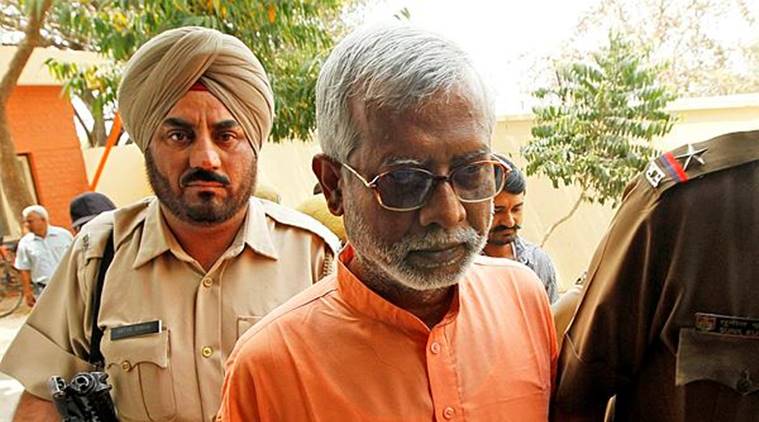 It failed to give the date on which Aseemanand expressed his desire to confess before a magistrate. (Source: Express Archive)
It failed to give the date on which Aseemanand expressed his desire to confess before a magistrate. (Source: Express Archive)
The CBI, which investigated the Mecca Masjid blast case before the NIA took over in April 2011, failed to produce even basic evidence to prove its case against Swami Aseemanand. It failed to show that Aseemanand and Shaik Abdul Kaleem, to whom he allegedly confessed in prison, were in the same jail at the same time. Also, it failed to give the date on which Aseemanand expressed his desire to confess before a magistrate.
The verdict by NIA court judge K Ravinder Reddy on April 16, acquitting all the accused, reveals glaring loopholes in the CBI’s case.
The judge also observed that the prosecution failed to prove beyond reasonable doubt that Devender Gupta, another accused, was communal because he was an RSS pracharak. The CBI also failed to validate Call Data Records as the investigation officer did not examine the service providers. The prosecution also could not explain why the investigating officer was in a hurry to record Aseemanand’s confession before a court in New Delhi when he could have done so in Hyderabad.
The CBI in its chargesheet had made Aseemanand’s confession — one in front of a magistrate at Tees Hazari courts in New Delhi and an alleged confession to Kaleem in jail — as the main evidence against him.
According to the CBI, Aseemanand met Kaleem in Chanchalguda prison. Kaleem used to serve food to him. When Aseemanand came to know that Kaleem was earlier arrested on suspicion of being involved in the Mecca Masjid blast, he had a change of heart and allegedly admitted to him that he was involved in the blast and repented that innocent men had been jailed.
In his 121-page judgment, judge Reddy observed that CBI’s investigation officer — SP Rajah Balaji — did not collect any documentary evidence from the jail authorities to show that Kaleem and another youth, Maqbool Bin Ali, were in Chanchalguda jail at the relevant time. “Except the oral testimony there is no other record to show that they were in jail when A6 (Aseemanand) was kept in that jail. The IO did not examine the then SP of Chanchalguda jail and record his statement showing that they were in jail during the period when A6 was in that jail. He could have collected the said material or recorded the statement of the jail SP but he did not do so,” observed the judge.
Stating that the evidence presented by the investigating officer that Devender Gupta and co-accused Lokesh Sharma were sent to Ajmer jail on production transit warrants disproves the version of Maqbool Bin Ali and Kaleem that they met them in jail besides Aseemanand. The judge observed that the testimony of both Kaleem and Ali was false. “Further this court holds that the presence of PW 104 (Ali) and PW 105 (Kaleem) in Chanchalguda prison when A6 (Aseemanand) was in jail is not proved beyond reasonable doubt. Having regard to so, the extra-judicial confession said to have been made by A6 before them is beyond scope and false,’’ wrote the judge.
He found holes in the statements provided by the CBI regarding Aseemanand’s confession before the Metropolitan Magistrate at Tees Hazari courts. The investigating officer told the court during cross-examination that Aseemanand expressed his desire to confess on December 10, 2010, while in his testimony he filed that Aseemanand sought to confess on December 16. The judge took the investigating officer’s statement in Court of Special Judge, CBI-I, in Jaipur and considered December 16 as the confession date.
“There is no explanation as to why the IO was in a hurry in moving an application before the CMM at New Delhi with a request to record the confessional statement of A6. He had ample opportunity to come down to Hyderabad and after expiry of police custody of A6 he would have moved an application before the jurisdictional court with a request to record the confessional statement,” the judgment said. “A6 was not provided legal aid by CMM at New Delhi though he was provided with legal aid during the first spell of police custody. The testimony of the judicial officer itself proves that on December 18, A6 was in police custody. Thus, this court holds that the confessional statement of A6 is hit by Section 26 of the Indian Evidence Act. This court holds that the confessional statement of A6 was not a voluntary one…”
With regard to Devender Gupta, the CBI failed to produce any evidence that he gave hate speeches in Jamtara in Jharkhand. The judge dismissed the oral evidence given by a special branch officer, who was collecting intelligence on activities of Hindu groups in the area.
“There is no record to show what were the communal hatred speeches of Devender Gupta (A1)… Nothing is there on record to show that A1 was booked in any case for his alleged speeches. The RSS is not proscribed organisation. If any person works in it, it does not give any scope that he is a communal and anti-social,” the judge wrote.